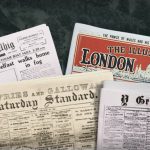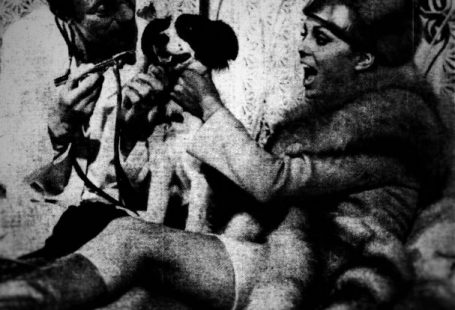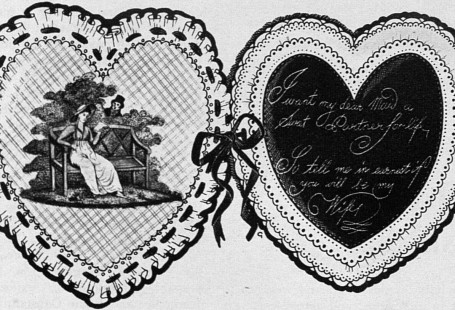From the 26th to the 31st August Afton Down on the Isle of Wight was home to one of the largest rock festivals the world has ever seen. With an attendance that surpassed Woodstock the previous year; it is estimated that between 600,000 to 700,000 people flocked to the 1970 Isle of Wight Festival.

With such large numbers in attendance, all did not go as planned, much like the revival of Woodstock in 1999. The festival was marred by petty theft, gate-crashers, and looting, causing some commentators to ask whether the 1970 Isle of Wight Festival marked the ‘last of the pop festivals.’
Register with us today and see what stories you can discover
And in this very special blog, using contemporary newspapers, we will take a look at the 1970 Isle of Wight Festival from beginning to end, tracing its highs and its lows.

The Festival Begins
Held in 1968 and 1969 with great success, the Isle of Wight Festival of 1970 was set to be the event of the year, with thousands flocking to the island off the south coast of England.

Indeed, on the first day of the festival, on 26 August 1970, the Daily Mirror reported how the main road from London to Portsmouth, the A3, had become ‘a swinging pilgrims’ route as youngsters from all over the world make for the Isle of Wight pop festival.’
The article described how:
The young people were on the march yesterday…down the road to the Isle of Pop. Youngsters in their thousands turned the main A3 London to Portsmouth route into a 1970-style pilgrim’s progress. They came from many different countries. They had different clothes, different languages, and different ways of travel. But they all shared a common aim…to reach the Isle of Wight by morning.
Anticipation was in the air, with Graham Wales for the Coventry Evening Telegraph writing on 26 August 1970 how the ‘Isle of Wight pop festival gets under way today.’ Wales revealed in his special pop column how music label Philips had released ‘what they claim to be the official festival disc,’ a track called ‘Let The World Wash In’ by the group Wight.
The Coventry Evening Telegraph journalist was sceptical about the tune, which was set to be ‘played non-stop in between acts throughout the whole festival.’ Wales dubbed it as fit for ‘interlude music only,’ for a ‘song in its own right it will never be.’

Its ‘official’ song aside, the 1970 Isle of Wight Festival was set to be a landmark event, the Aberdeen Evening Express capturing the atmosphere as it pictured on 27 August 1970 ‘three young men’ carrying three ‘youngsters’ on their shoulders, walking through the festival site.
But soon, the air of excitement would be marred by reports of black market drug rings, riots and petty theft.
Cannabis, Curry Powder and Chief Inspector Cutcliffe
Reports from the early days of the 1970 Isle of Wight Festival centred on something rather unexpected for a music festival: curry powder. The Daily Mirror on 28 August 1970 perfectly captured the almost farcical nature of the story, describing how:
The police thought that the pop fans had cannabis. The pop fans themselves thought that they had cannabis. But when the ‘drug’ was analysed it was found to be…curry powder.
This discovery, the Daily Mirror reports, led to the investigation of a possible ‘black market ring passing off powder as cannabis.’ Meanwhile, ‘pep pills’ amongst festival attendees were revealed to be saccharin, an artificial sweetener.

A statement was made by Chief Inspector George Cutcliffe, who was in ‘charge of Press relations at the festival.’ Cutcliffe told the media how Hampshire’s Chief Constable was ‘very worried about young people who may be inveigled by older people into trying and buying drugs,’ but also stated how ‘no action would be taken against anyone aged under seventeen who had drugs and handed them over to the police.’
The Daily Mirror detailed how twenty people had already appeared in court at Newport, the majority of them having been ‘accused of drug offences.’ But Chief Inspector Cutcliffe was on hand to provide some reassurance, emphasising how ‘there was no drug wave at the festival.’
‘Drug wave’ or no, reports of violence and unrest at the 1970 Isle of Wight Festival were also hitting the headlines in both the national and regional press.
‘Riot At The Big Pop Show’
A short headline at the bottom of the Daily Mirror back page on 28 August 1970 ran with the words ‘Riot At The Big Pop Show,’ the sentences below it reading like some sort of dispatch from a warzone:
Big riot broke out at Isle of Wight Pop Festival as mob of French fans tried to ‘gatecrash’ show. Security men said to be in control, but police standing by.

Of course, it was a foreign element of the crowd causing trouble at the festival, at least according to the press.
Meanwhile, the Coventry Evening Express on 28 August 1970 detailed how ‘pop fans’ had ‘crashed’ the festival’s barriers, reporting how:
There was fresh trouble at the Isle of Wight pop festival today as fences to the arena were torn down by desperate fans trying to get the best vantage point for the stage. They streamed through the broken walls as security men and guards rushed to the trouble spot. They were soon held back. A special ‘snatch squad’ of 10 guards with dogs waited out of sight with orders to go into battle.

Again, the press report read like something from a warzone, although the nationalities of these ‘desperate fans’ were not highlighted.
Meanwhile, ‘petty thieves’ were also said to be ‘plaguing the huge camping area,’ as a report in the Daily Mirror described. Police had some rather odd advice to offer, ‘warning fans to tighten up tent security and try form their own vigilante group.’

But some good news also emanated from the festival, as the Daily Mirror on 28 August 1970 reported. A wedding had taken place between ‘two barefoot hippies,’ namely 23-year-old New Zealander Alan Funnell and 19-year-old Edinburgh native Carol Kelly, who had met at a pop festival in Worthing, West Sussex, some two months before.
Alan and Carol were married at the ‘tiny 15th century church at Mottistone,’ some five miles away from the festival, the Daily Mirror writing how:
Carol wore an orange kaftan with black trousers and a white band around her hair. Alan wore a black T-shirt and jeans. The sixteen hippie guests were similarly dressed. But the best man wore a carnation…in his headband.
This fluctuation between good news stories and tales of bad behaviour would be central to the press reporting on the festival, something that a Sunday Mirror article on 30 August 1970 would highlight.
Not Quite A ‘Pop Island Paradise’
By the time the Sunday Mirror was published on 30 August, some four days after the 1970 Isle of Wight Festival had begun, and a day before it was due to end, organisers of the event, Fiery Creations, had threatened to ‘bring the whole thing to a halt.’
This threat, the Sunday Mirror explains, was an attempt to ‘get a group of hippies down from a spotlight tower where they had climbed for a better view.’ The tower was ‘leaning and thought to be in danger of collapse,’ and eventually the group decided to climb back down.
Elsewhere, other fans were avoiding paying for the festival altogether, ‘by moving on to the so-called Devastation Hill, overlooking the arena.’ Camping space was so sparse here, however, that ‘some fans pitched their tents on a local golf course.’

The Sunday Mirror also reported how 120 people had been arrested for possessing drugs, whilst there was also a ‘long queue of fans outside the festival hospital’ by the penultimate day of the festival. Some of these fans, the newspaper says, ‘had drug problems,’ whilst others had colds, caused by a ‘lack of camping experience.’
Meanwhile, some of the women visiting the festival hospital had had their birth-control pills stolen, and were met with this dismissive statement from an official:
‘Of course, we cannot supply their needs, we are not here to sort out their sex lives.’

A slightly bizarre moment during the festival came on the Saturday night, as American singer Tiny Tim (real name Hebert Khaury) got the crowd ‘swinging’ with some unusual song choices, namely ‘Land of Hope and Glory’ and ‘There’ll Always Be An England.’ The Sunday Mirror observed how ‘it was a moment when the beat generation sang the songs of their fathers – a moment that fleetingly bridged the generation gap.’
The festival’s biggest draws, Joan Baez and Jimi Hendrix, were set to perform that Sunday, although organisers were again faced with the idea of calling off the festival, this time due to financial concerns. Publicity director Peter Harrigan dismissed such a notion, however, although the festival organisers were in need of ‘another £92,000 to break even.’ Harrigan discussed reducing the performers’ fees in a bid to salvage costs, and the show would go on, at whatever the price.
The Sunday Mirror summed up the festival quite neatly, it being something of a curate’s egg:
The pop island Paradise hasn’t quite lived up to its name. But if you are young and can look after yourself and the sun stays out and the music stays loud, does it matter?
Chaos and Confessions
The last two days of the 1970 Isle of Wight Festival would prove to be the most dramatic. By the final day, organisers were provoked into making the event free.

Kenelm Jenour, for the Daily Mirror on 31 August 1970, reported how ‘rioting gangs looted souvenir shops at the Isle of Wight pop festival’ during the previous evening. The majority of the crowd enjoyed the music, unaware of the chaos that was unfolding, reminiscent of the scenes at the 1999 revived Woodstock event:
Armed with iron bars, bricks and bottles, several hundred youths raided twelve of the festival’s sixteen souvenir shops. They looted foods – and then set fire to the shops.
Jenour reports how these ‘troublemakers were mainly gangs of Hell’s Angels and French and Algerian anarchists,’ again blaming foreign fans for antisocial behaviour. But in the face of such behaviour, the organisers, Fiery Creations, made the festival ‘free to everyone,’ despite a potential loss of £75,000.
Organiser Ron Faulk was quoted as saying:
‘We made the festival free to the fans. Why must they destroy everything?’
But amongst all of this chaos, some peace was to be found at the festival. The Daily Mirror, also on 31 August 1970, pictured a ‘young girl’ walking with a priest through a ‘quiet field as he hears her confession.’

On the Sunday morning of the festival, meanwhile, a mass was held, the altar standing ‘on a farm trailer which has been towed there by a tractor.’ It was not all riots and looting, backed up by Chief Inspector Cutcliffe, who stated how the ‘vast majority of the thousands of young people here are extremely well behaved.’

The Clean Up
The festival was wrapping up, and it was time for its attendees to leave the island. The Daily Mirror addressed the huge logistical mission of helping thousands of festival goers to leave the Isle of Wight:
The festival ends at nine this morning. The organisers decided to keep the show going all night so that the fans would not leave all at once. Thousands started to leave yesterday. Every bus and coach on the island was sent to the festival to take the fans to the ferries. The British Rail ferries operated all night and extra trains were laid on to London and the North.

By the Monday, the Coventry Evening Telegraph was reporting how ‘the Isle of Wight pop festival is finally silent, except for a couple of hippies playing bongo-drums and a transistor blaring occasionally in the wind.’
Left behind the so-called ‘strictly weekend hippies’ was a ‘scene of smelly devastation.’ Strewn across the 30-acre site were deserted cardboard and polythene bivouacs. Whilst for those in need of funds for the trip home, organisers were offering money in exchange for help in clearing up the festival area. The organisers claimed, furthermore, that ‘£30,000 worth of damage was caused by mobs’ in their attacks on the fences and shops at the festival, but police said this estimate was an ‘exaggeration.’
‘The Last of the Pop Festivals?’

In the wake of the clean up at the 1970 Isle of Wight Festival, the Illustrated London News was asking whether the event marked the ‘Last of the Pop Festivals?’ The article began by stating how:
Pop culture experts who have long foreseen the demise of the large pop festival and forecast that this year’s occasion at the Isle of Wight would be the last of the big ones have been borne out by the allegedly unprofitable confusion at Freshwater, IoW, last weekend.
The money was just not adding up, despite a reported attendance, at the time, of some 400,000 people. It was revealed that organisers Fiery Creations had spent some £500,000 on the festival, and were now £70,000 down on ticket sales, although they hoped to rescue some revenue ‘from catering, stallholders’ fees, and film rights.’
And it wasn’t just about the money, with accusations of violent behaviour, ‘pot smoking’ and nudity being levelled at the festival. Although such accusations were dismissed by Hampshire Chief Constable Mr. D. Osmond, who was quoted as saying that the ‘event was very pleasant,’ with ‘militant extravagances’ to be ‘blamed on the lunatic fringe.’
On this count, the Illustrated London News agreed, stating how:
It should be remembered that the festival saw less violence than many football matches and spared outsiders the fearsome antics of the skinheads.

But even after the festival, financial issues continued to plague its organisers. On 6 September 1970 the Sunday Mirror reported that a row had arisen after a £2,500 cheque was paid to band the Moody Blues, their road manager Alex Hosford complaining how:
We have had nothing but trouble since we were first asked to play at the festival. We pulled out once. Now this business of the cheque is the last straw.
Organiser Ron Faulk hit back, saying that he believed the cheque to the band had cleared, but it being a Saturday, he was unable to confirm this with the bank.
By 10 September 1970, the Newcastle Evening Chronicle was reporting how Fiery Creations would not be organising ‘another mammoth pop festival,’ the statement coming from Ron Faulk. The group had had their ‘fingers burned,’ and expected to lose between £20,000 to £30,000 on the venture.

But did this mark the end of the pop festival? Of course it didn’t. Just a few months later the first ever Glastonbury Festival was held, and the rest, as they say, is history. And as for the Isle of Wight Festival, it was revived in 2002, and millions and millions of people across the United Kingdom now attend festivals every year.
The Isle of Wight Festival of 1970 was, therefore, far from being the last of the big pop festivals. In fact, the big pop festivals were only just get started.
Register with us today and see what stories you can discover





